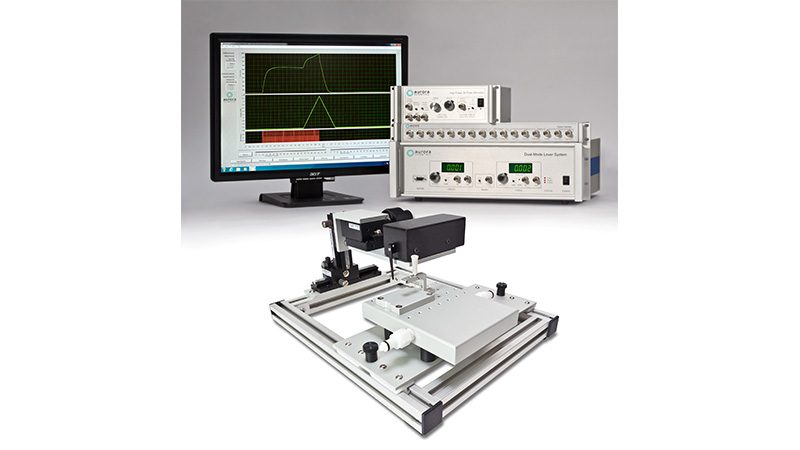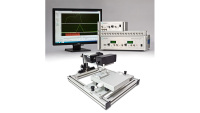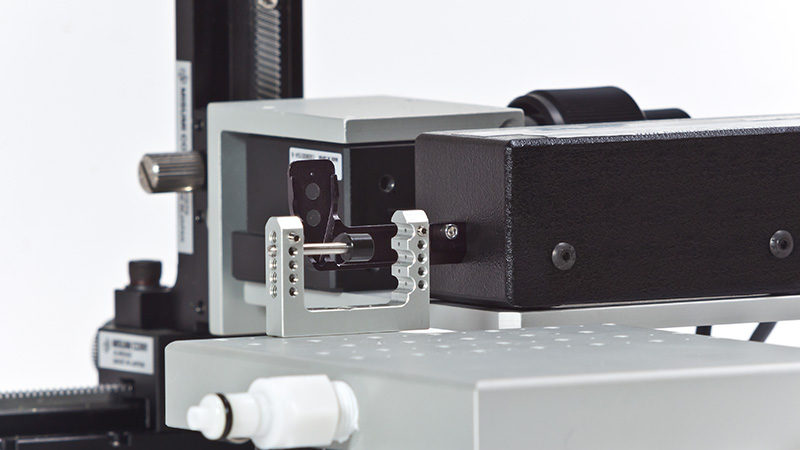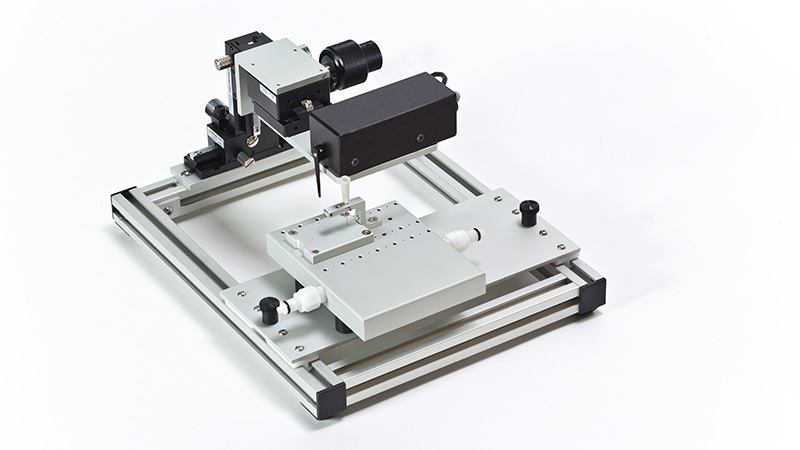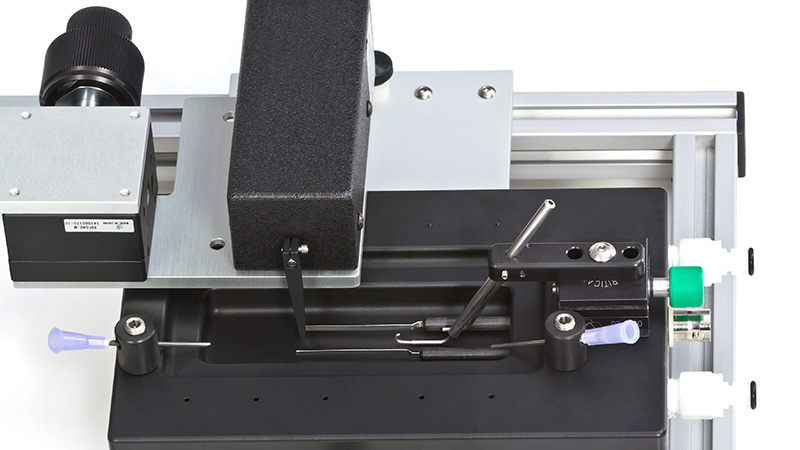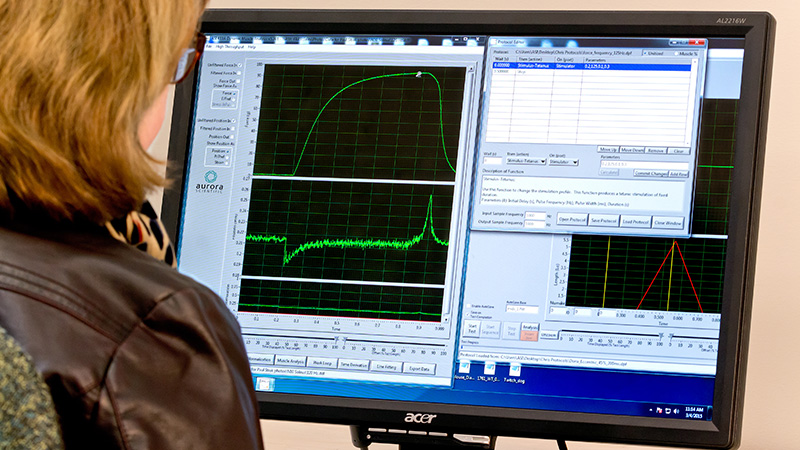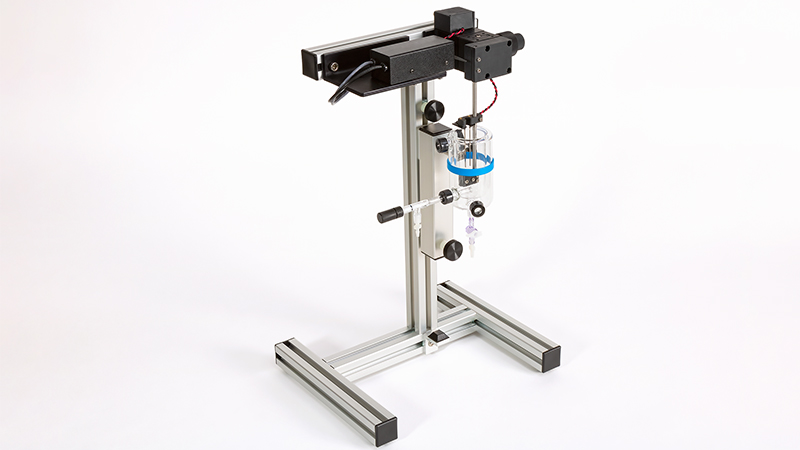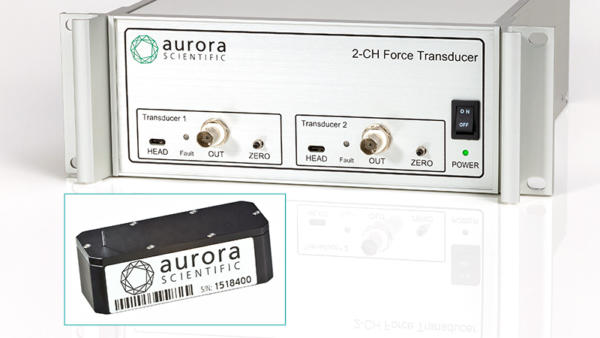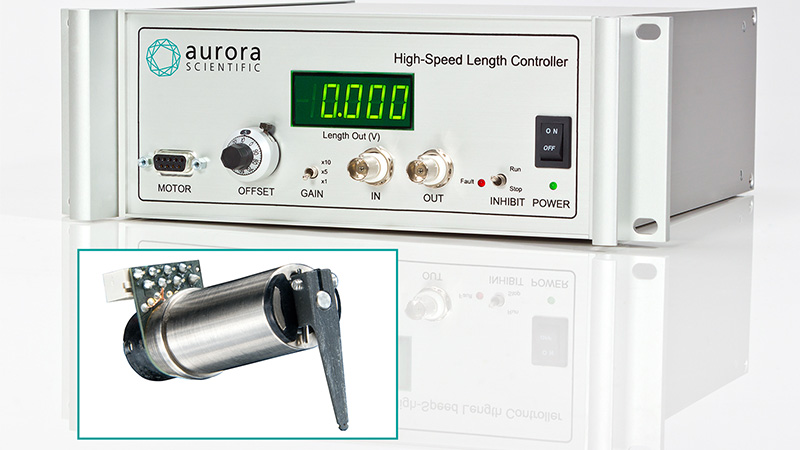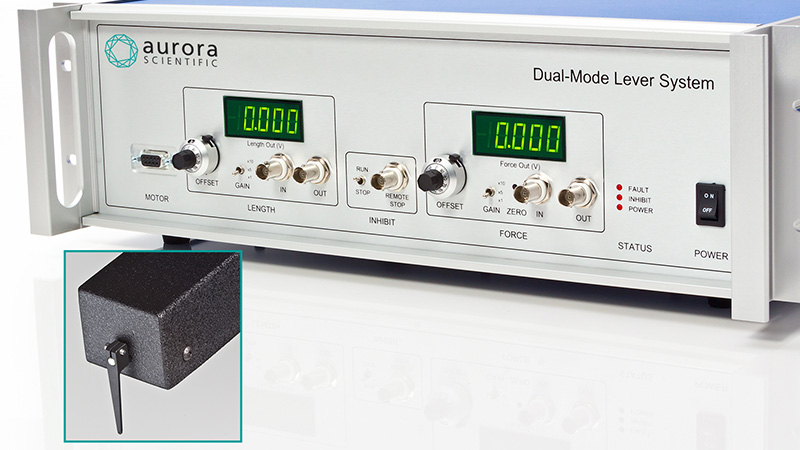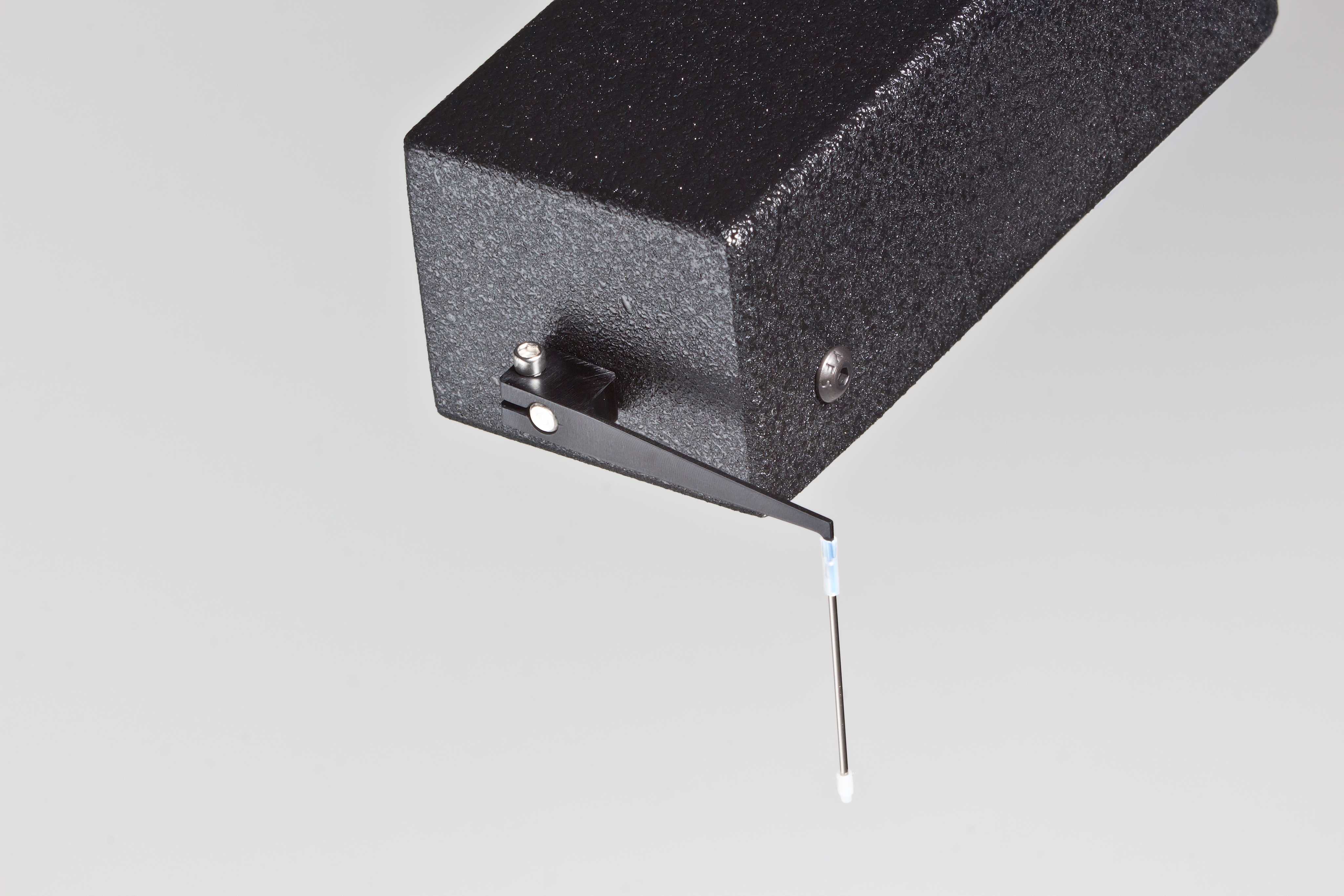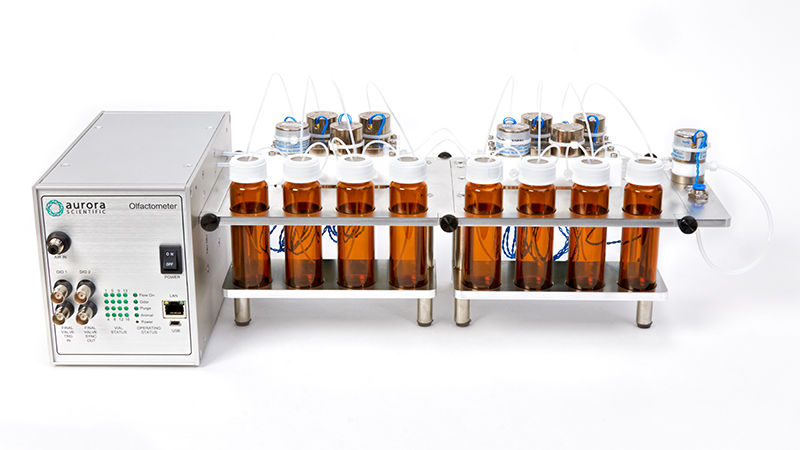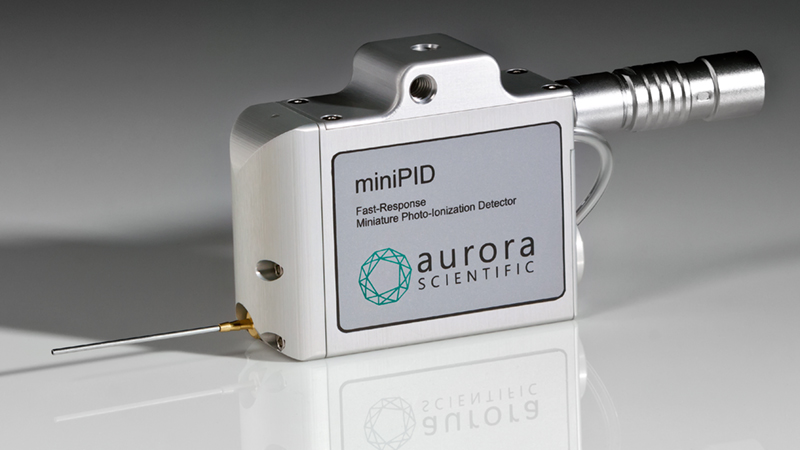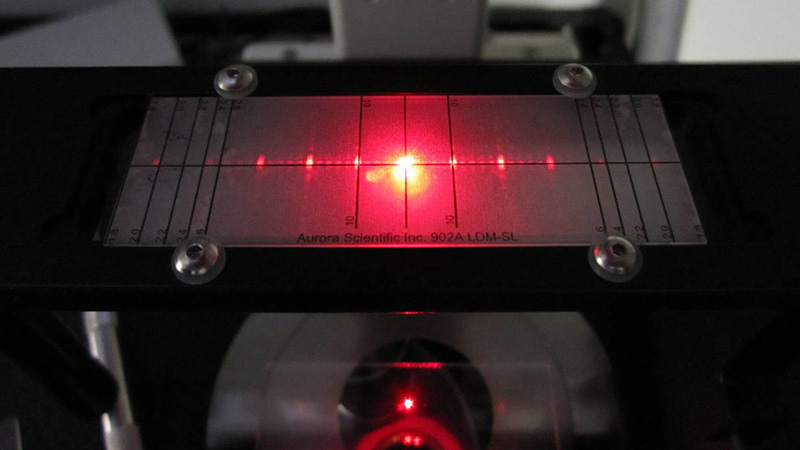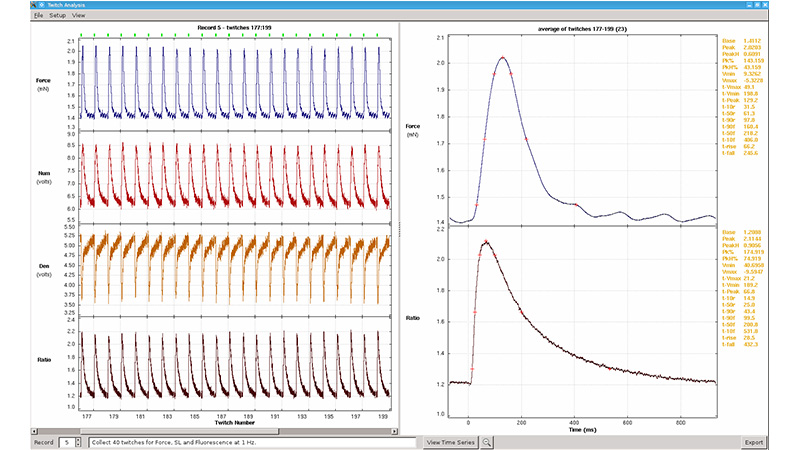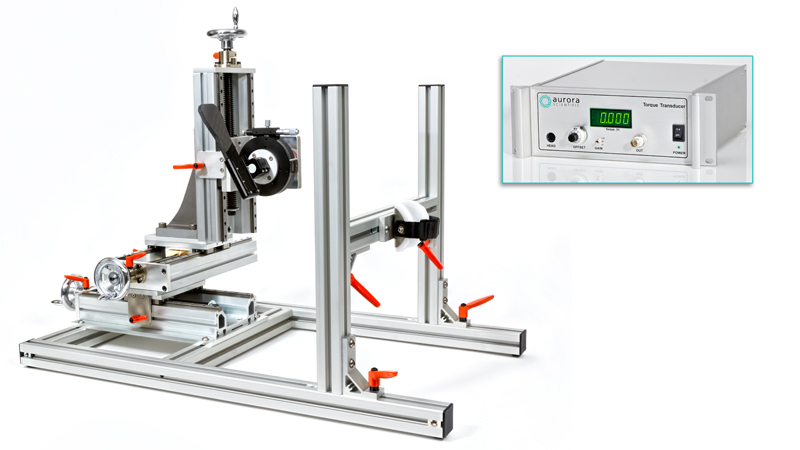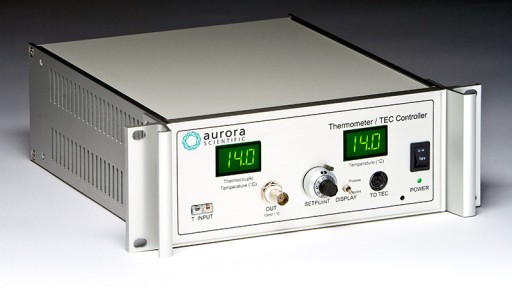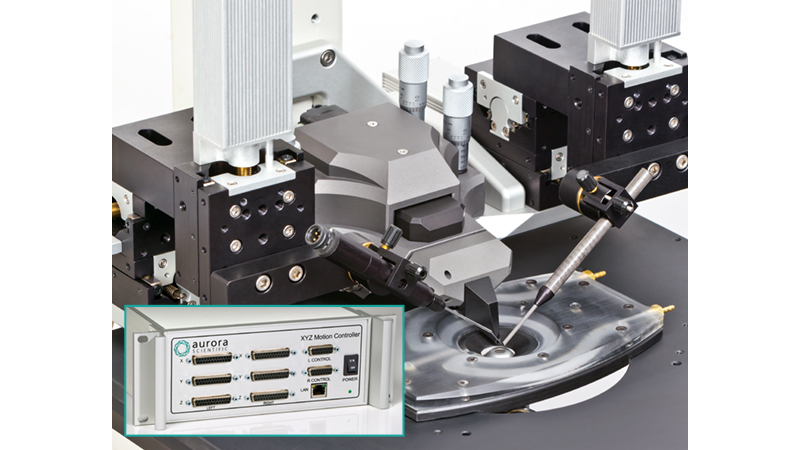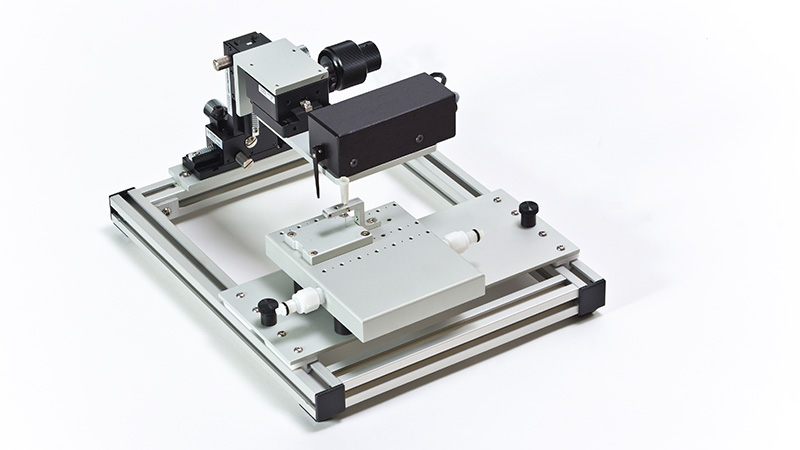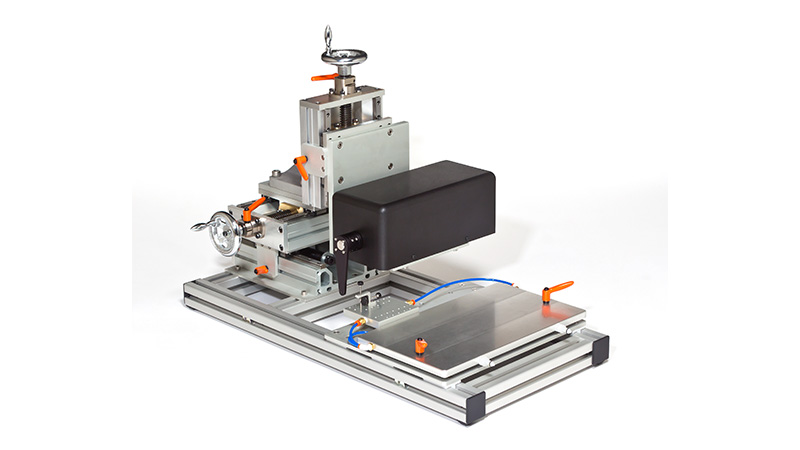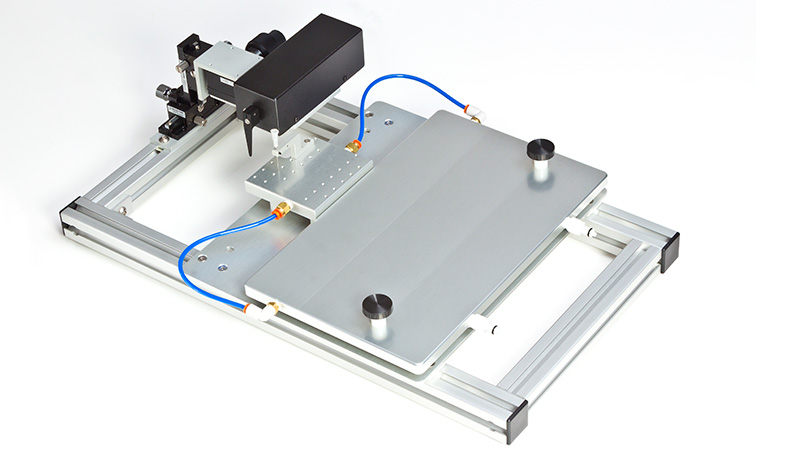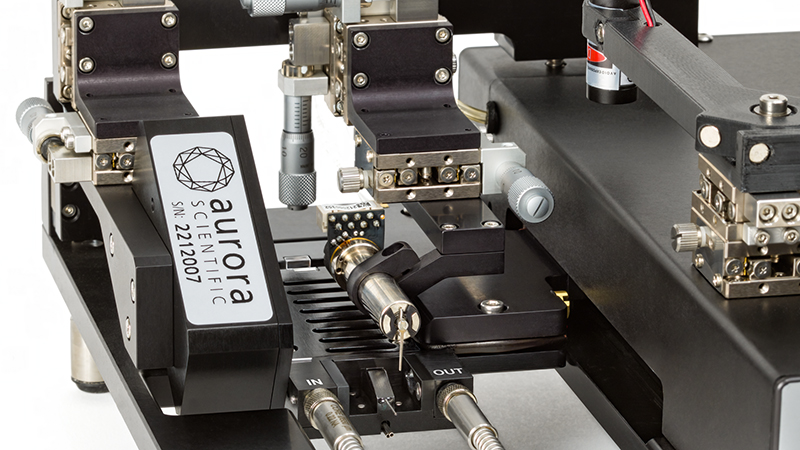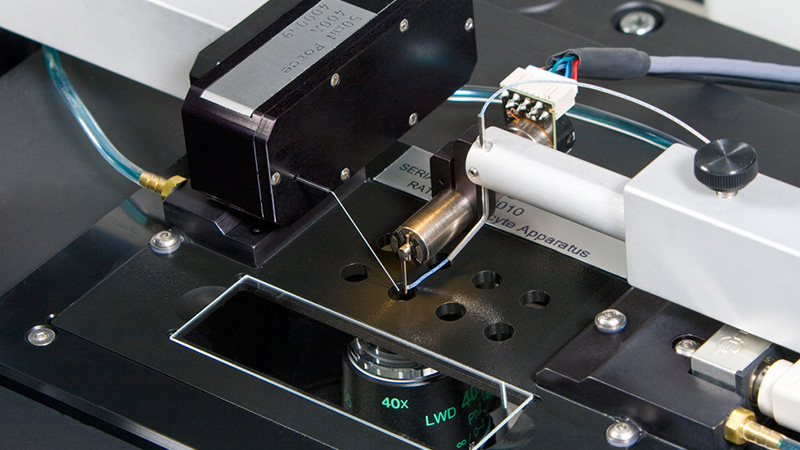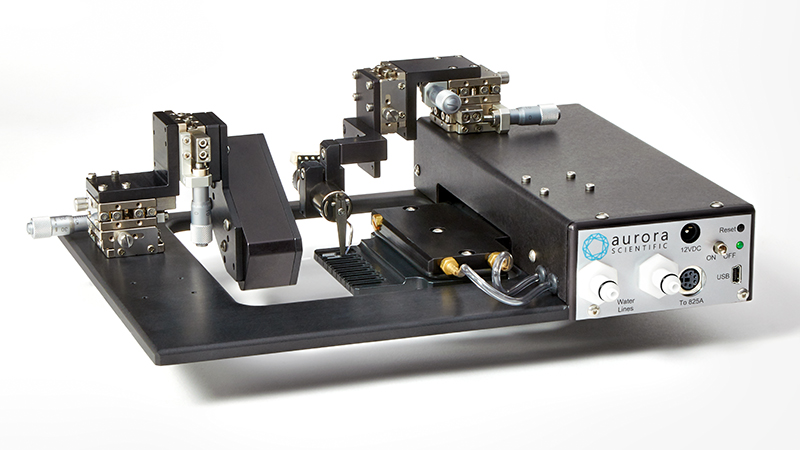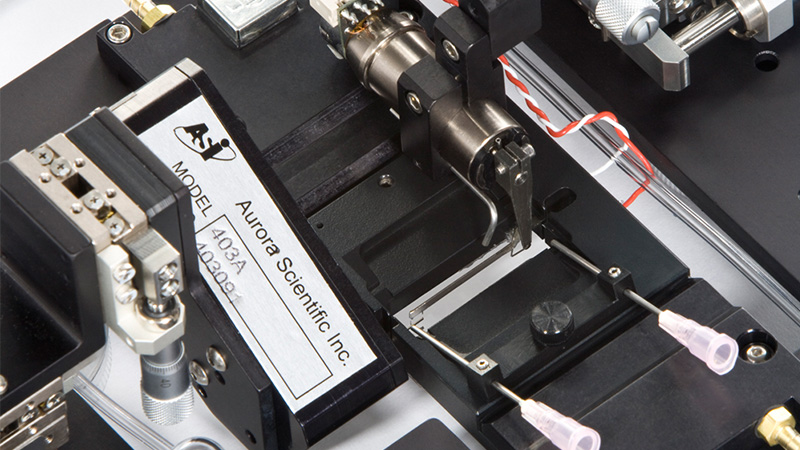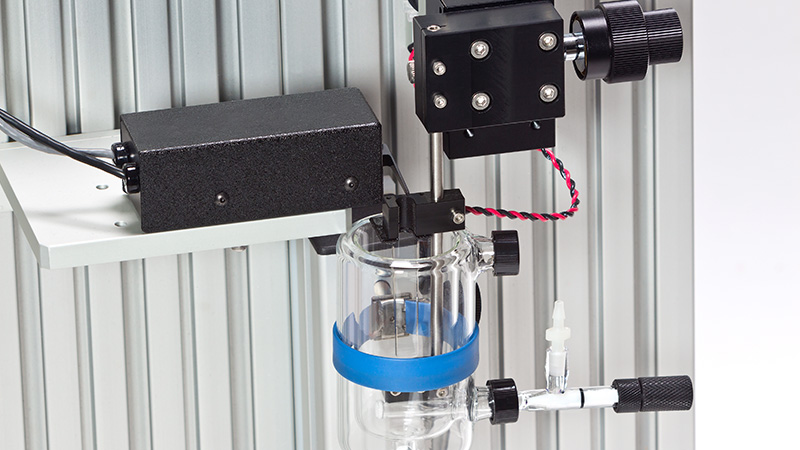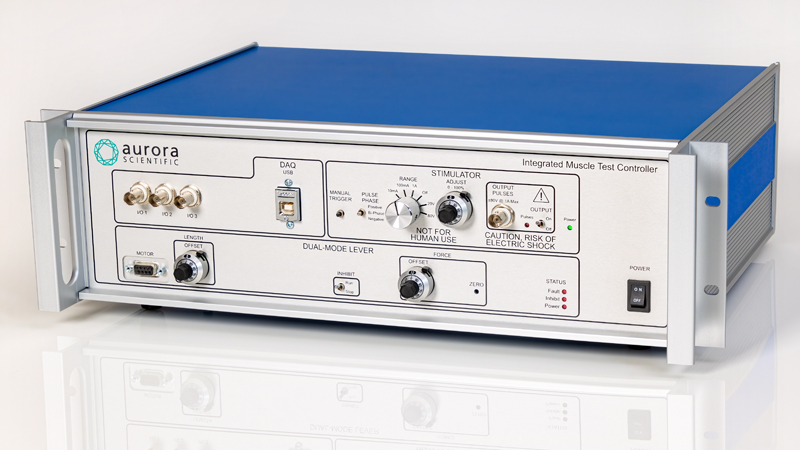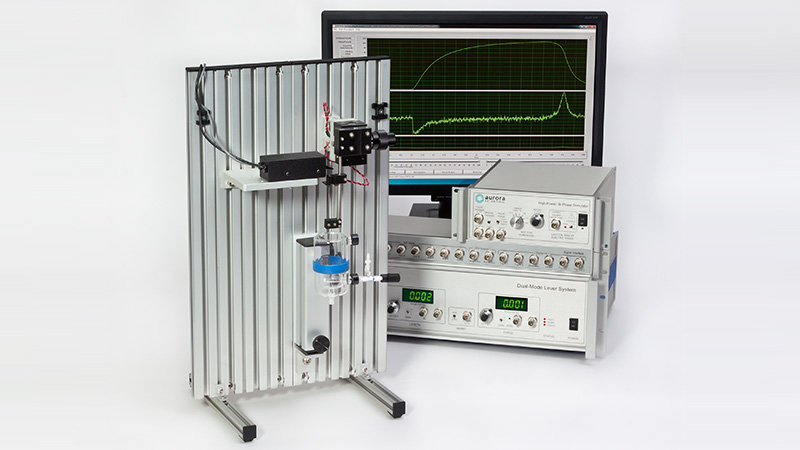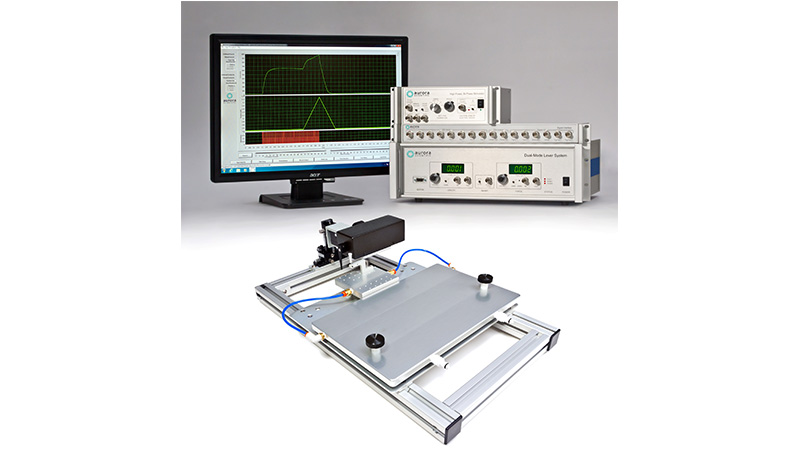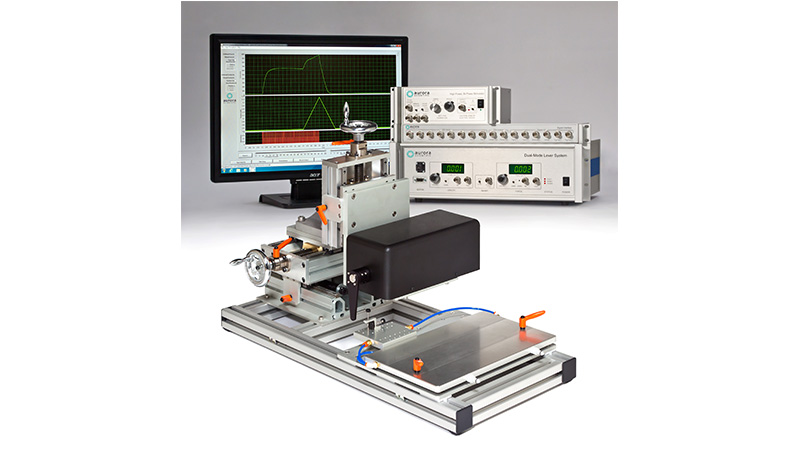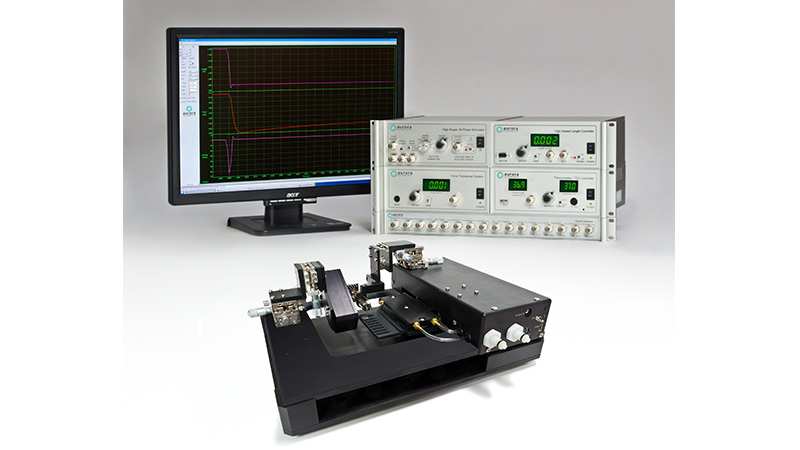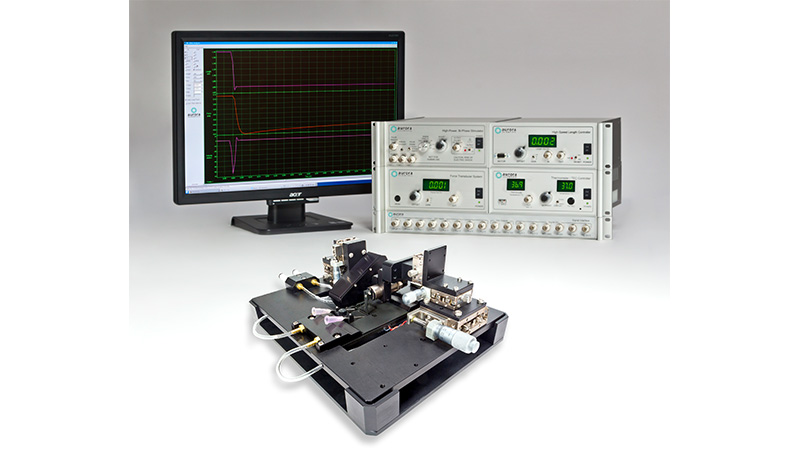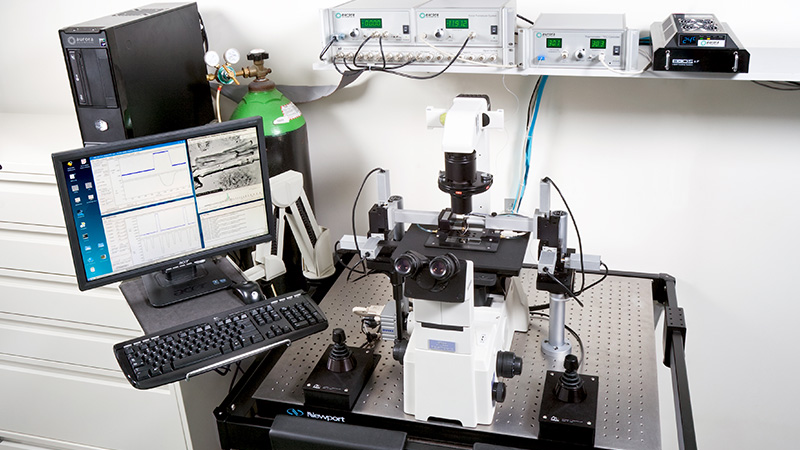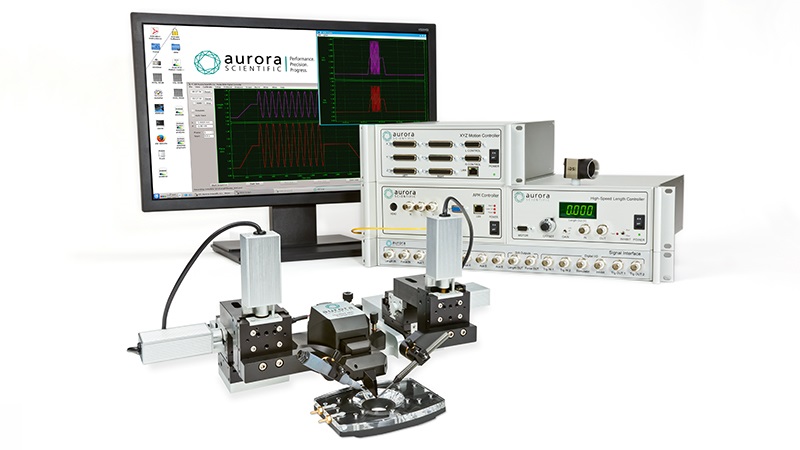1300A:三合一整体动物肌肉测试系统 (小鼠)
一个多功能性的系统: 能够弹性地应用 “活体,原位,离体”三种不同的实验技术去准确地测量啮齿类动物的肌肉性能
|
|
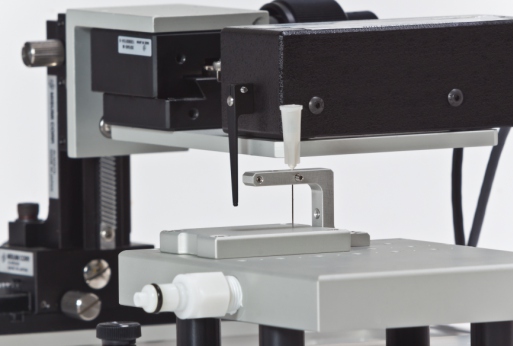 |
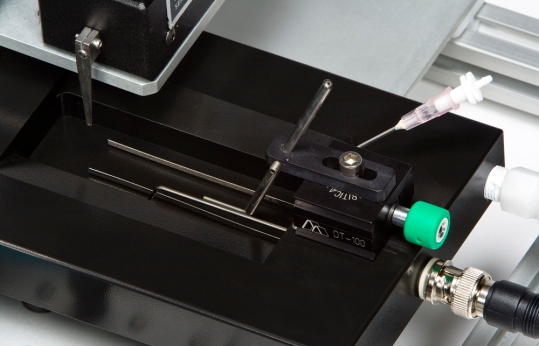 |
| 活体实验装置 | 原位实验装置 | 离体实验装置 |
1300A 和 1305A 是高性能和高精确度的测试系统,让研究者利用简要的方法去测量肌肉的张力和各种力学性能。
通过把活体肌肉测试,原位肌肉测试和离体肌肉测试三种技术融合到一个系统里面,使研究者能够捕捉到啮齿类动物肌肉生理的全貌。测试系统配备针对小鼠或大鼠的实验平台装置(可与控温器组合),而且能配合不同的夹器把动物的身体和後肢固定在一个平台上,得以在实验当中保持稳定。另外,透过简单的置换,可以把装置的动物平台更换成
一个25ml容积的横向浴盆,去进行离体肌肉测试实验。这个系统更应用了Aurora Scientific 的旗舰双模肌肉杠杆系统; 一个双模传感器,不仅能测量力度和长度,同时也有控制力度和长度的能力。
建立於双模传感器强大能力的基础上,肌肉样本和双模传感器之间只需要一个连接点,就能够同时去进行力度和长度的测量和控制,大幅减省了实验操作时程,同时也提高了数据生产率。除此之外,系统也备有高能双相刺激器和相应的电极。
数据采集方面,控制和分析软件会预先安装在电脑主机之中。实验前操作准备,数据采集和数据分析都能通过我们的控制和分析软件(DMC/DMA)在数分钟内完成。静息长度,静息力度,刺激等参数和进行实验的方案都可以通过控制软件(DMC)去设置。电脑桌面也会提供标准实验方案的扩充程式库,方案包括: 抽搐张力,强直收缩张力,疲劳,力-刺激频率,力-收缩速率,硬度和功循环等。
● 高实验产出
● 高速的数据采集和分析软件: 用於Windows 或 Linux 操作系统
● 双用刺激器: 通过电场或神经进行刺激
● 可进行理想的活体动物实验方案: 精密且可控温的平台
● 在一个系统的基础上,可以组合测试小鼠和大鼠的配置
● 测量的力值峰度: 0.5N至10N
● 能够进行更多复杂且多方面测量的方案
● 测量力度峰值可达10N(1000g)
1300A/1305A/1310A用于小鼠,大鼠,狗,猪和其他大型动物的全动物系统
我们的1300A系统最初仅设计用于在小鼠和大鼠中进行足板(体内)实验。它迅速扩展成一个系统,也可用于原位实验,并建立了水平体外附加浴。后来建造了各种版本的系统,以适应更大的动物模型,直至猪和狗的大小。可以执行的典型实验与1200A系统系列的实验相似,不同之处在于可以通过原位方法测试更广泛的肌肉选择。那些没有手术可及肌腱或非常大而无法在体外测试的肌肉现在可能使用原位方法发挥作用。
常见样品:
骨骼肌-离体:趾长伸肌(EDL)、比目鱼肌、跖肌、横膈膜、蚓状肌
骨骼肌-原位:胫前肌(TA)、腓肠肌、股四头肌、腘绳肌、舌头、肩袖
骨骼肌-活体:背屈(TA,EDL)、足底屈肌(胃,比目鱼,足底)、下颌、食指(趾短屈肌FDB)
人造肌肉和结缔组织:软骨、上皮组织、肌腱
常见实验:
抽搐:设计用于引起单个或少量肌肉纤维收缩的单脉冲。

强直收缩:快速连续多次电脉冲,导致时间总和和完全肌肉收缩。

疲劳:经常重复次最大的强直性收缩,以引起肌肉疲劳。

力频率:改变刺激频率的速率,以评估引起最大强直作用力的最佳频率。

不规则:在等长强直性收缩过程中主动拉伸肌肉以诱发损伤并评估对损伤或从中恢复的抵抗力。

步态分析/建模练习(等渗,同心):控制肌肉力量输出(等渗)以评估肌肉的缩短速度。

刚度:被动正弦延长和肌肉缩短,以评估组织的固有刚度。

应力应变:增量延长组织以计算材料的杨氏模量。

Al-Sajee, Dhuha et al. “Xin-deficient mice display myopathy, impaired contractility, attenuated muscle repair and altered satellite cell functionality.” Acta Physiologica (2015) DOI: 10.1111/apha.12455
Maino et al. “Targeted genome editing in vivo corrects a Dmd duplication restoring wild-type dystrophin expression” EMBO Molecular Medicine (2021) DOI: 10.15252/emmm.202013228
Maino et al. “Targeted genome editing in vivo corrects a Dmd duplication restoring wild-type dystrophin expression” EMBO Molecular Medicine (2021) DOI: 10.15252/emmm.202013228
Lonh et al. “Specific inhibition of myostatin activation is beneficial in mouse models of SMA therapy” Human Molecular Genetics (2019) DOI: 10.1093/hmg/ddy382
VanderVeen et al. “Skeletal muscle function during the progression of cancer cachexia in the male ApcMin/+ mouse” The Journal of Applied Physiology (2018) DOI: 10.1152/japplphysiol.00897.2017
Rooney, Jachinta and Rich Lovering “Single muscle contractile measurements in vivo and in situ.” NIH (2015) DOI: N/A
Alway, Stephen E. and Robert G. Cutlip “Resistance Loading and Signaling Assays for Oxidative Stress in Rodent Skeletal Muscle.” Methods in Molecular Biology Myogenesis (2011) DOI: 10.1007/978-1-61779-343-1_11
Gallot et al. “PERK regulates skeletal muscle mass and contractile function in adult mice” The FASEB Journal (2019) DOI: 10.1096/fj.201800683RR
Leduc et al. “Parkin overexpression protects from ageing-related loss of muscle mass and strength” The Journal of Physiology (2019) DOI: 10.1113/JP277157
Ganji et al. “Optogenetic activation of muscle contraction in vivo” Connective Tissue Research (2021) DOI: 10.1080/03008207.2020.1798943
Ganji et al. “Optogenetic activation of muscle contraction in vivo” Connective Tissue Research (2021) DOI: 10.1080/03008207.2020.1798943
Distefano, Giovanna et al. “Neuromuscular Electrical Stimulation as a Method to Maximize the Beneficial Effects of Muscle Stem Cells Transplanted into Dystrophic Skeletal Muscle.” PLoS ONE (2013) DOI: 10.1371/journal.pone.0054922
Goh et al. “Myonuclear accretion is a determinant of exercise-induced remodeling in skeletal muscle” eLife (2019) DOI: 10.7554/eLife.44876
Goh et al. “Myonuclear accretion is a determinant of exercise-induced remodeling in skeletal muscle” eLife (2019) DOI: 10.7554/eLife.44876
Quattrocelli et al. “Muscle mitochondrial remodeling by intermittent glucocorticoid drugs requires an intact circadian clock and muscle PGC1α” Science Advances (2022) DOI: 10.1126/sciadv.abm1189
Berman et al. “Muscle contraction induces osteogenic levels of cortical bone strain despite muscle weakness in a mouse model of Osteogenesis Imperfecta” Bone (2020) DOI: 10.1016/j.bone.2019.115061
Lamin et al. “microRNA‐29a Regulates ADAM12 Through Direct Interaction With ADAM12 mRNA and Modulates Postischemic Perfusion Recovery” Journal of the American Heart Association (2022) DOI: 10.1161/JAHA.122.025727
Mou et al. “Influenza A Virus-Driven Airway Inflammation may be Dissociated From Limb Muscle Atrophy in Cigarette Smoke-Exposed Mice” Frontiers in Pharmacology (2022) DOI: 10.3389/fphar.2022.859146
Brightwell et al. “In vivo Measurement of Knee Extensor Muscle Function in Mice” Journal of Visualized Experiments (2021) DOI: 10.3791/62211
Brightwell et al. “In vivo Measurement of Knee Extensor Muscle Function in Mice” Journal of Visualized Experiments (2021) DOI: 10.3791/62211
Xu et al. “Efficient precise in vivo base editing in adultdystrophic mice” Nature communications (2021) DOI: 10.1038/s41467-021-23996-y
Xu et al. “Efficient precise in vivo base editing in adultdystrophic mice” Nature communications (2021) DOI: 10.1038/s41467-021-23996-y
Thomas, Melissa M. et al. “Early oxidative shifts in mouse skeletal muscle morphology with high‐fat diet consumption do not lead to functional improvements.” Physiological Reports (2014) DOI: 10.14814/phy2.12149
Ambrosio, Fabrisia et al. “Arsenic induces sustained impairment of skeletal muscle and muscle progenitor cell ultrastructure and bioenergetics.” Free Radical Biology and Medicine (2014) DOI: 10.1016/j.freeradbiomed.2014.06.012
Bukovec et al. “A novel ex vivo protocol to mimic human walking gait: implications for Duchenne muscular dystrophy” Journal of Applied Physiology (2020) DOI: 10.1152/japplphysiol.00002.2020


